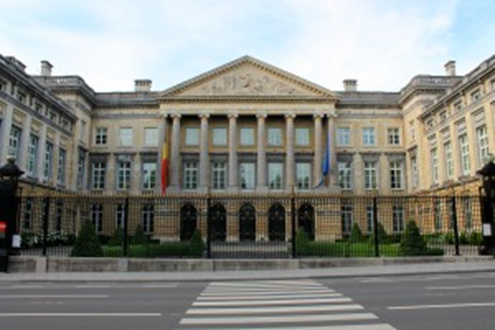QUENTIN GENARD
‘I pledge fidelity to the King, obedience to the Constitution and to the laws of the Belgian people’. Saying these words, 14 members of Michel I’s government took office on Saturday 11th of October 2014. For many, this government is particularly interesting. The following article will explain why exactly it is so and will present briefly its already rich history.
When last time Belgian politicians sat together at the negotiation table to discuss the program of the governmental action in 2010 it took 541 days to strike a deal. Events of the weeks following the elections, which took place on May 25th, were carefully observed by the Belgian and European media. As described in the previous article, this time the political landscape was quite different though – economic not institutional reforms were the main topic on the agenda. As far as economy is concerned, right-wing parties from the North and the South have quite a lot in common. The government was formed in ‘only’ 139 days. The country didn’t cease to function normally thanks to a caretaker government, which, although deprived of its parliamentary legitimacy and thus not allowed to make any major political decisions, was able to manage daily operations. However, given that beggars can’t be choosers, the constitutional scope of ‘caretaking’ was extended to a very broad meaning. So broad that Belgium sent F-16 fighters to fight Islamic State at a time when it still didn’t have a fully-fledged government. In cases like that, the Parliament adopts a resolution authorising the care-taking government to act.

The Michel I’s government is extraordinary also because of its composition. Four political parties, out of which only one is Francophone, agreed to participate in talks. This is a really unique case in the Belgian history. Bearing in mind the fact that language is the main cleavage in the Belgian politics, parties from the South of the country have always claimed that there should be a counterweight to a dominance of the Flemish and that no organization should be allowed to represent the Francophones in the government on their own. The liberal party called MR (Mouvement réformateur), which forms the ALDE group in the European Parliament, decided to join the negotiations for the three following reasons.
Firstly, it has been expelled out of the Wallon and the Federation Wallonie-Bruxelles governments. MR is a party with a large number of high-fliers, so there was a huge internal pressure to find their members prestigious posts. The federal government is a linguistically neutral institution – the number of French- and Dutch-speaking members of the government should be the same so MR would be the only French-speaking party in the proposed configuration. It has therefore the right to take half of governmental seats which means its members can nominate six ministers and the prime minister. It’s worth noting that, it’s not a common thing for the leader of the government to be included in the linguistic game. Person taking this office should be ‘linguistically asexual’ – former prime minister wasn’t part of either the French- or the Flemish-speaking group.
Secondly, all parties were ideologically close in terms of economy. MR has its Flemish-speaking counterpart in Open-VLD. NV-A, the Flemish independence party, also forming the government, is willing to conduct economic reforms that, in their current form, are quite similar to those proposed by MR. Finally, there is CD&V, the Flemish Christian-democratic party, which tuned out to be the most troublesome partner during the negotiations – its strong left-wing fraction demanded a lot of guarantees if they were to vote for the participation in the government. As a result, the government program has become rather right-wing, with a bit of social touches. It includes: reduction of public expenditures by 8 billion euros, reduction of taxes for companies amounting to 3.5 billion euros, taxation of financial assets (a CD&V’s demand), a rise of the retirement age to 67 years and an introduction of the obligation for the unemployed to perform a civic duty if they want to receive any unemployment benefits.

Thirdly, it was made very clear that the issue of institutional reform shouldn’t be risen during this government’s term. However, the situation is already changing. At the very end of the negotiations NV-A asked for the possibility to reform the article 195 of the Constitution. It keeps the doors open for the next institutional reform. A newly-appointed MR minister declared ‘we are not naive, we know that everything can be institutional’. It is a dangerous bet for MR though – recent poll showed that 51% of the French-speaking Belgians didn’t approve the party’s choice to enter the negotiations.
There are two more facts about the current government that are worth mentioning. The first thing is that there are only 3 women in this body (out of the 14 members) and none of them is a deputy prime minister. Even more interestingly, NV-A, independent party, obtained all key posts: internal affairs, defense and finance.
It seems fair to say that the incoming government is already under huge pressure, especially MR. The party faces unfavorable opinion of its voters, who don’t approve its actions, as well as fierce opposition saying that MR betrayed the French-speaking. Belgium chose its government rather quickly (at least for Belgian standards), but at what cost for the Francophones?

Brabanconne statute. Located in the « Liberty area », it represents the Belgian revolutions and the constitutional freedoms.
It also reminds Belgi of the national anthem that includes the following phrase ‘O Belgium, we pledge, you will live’.
All the pictures are the property of the author and can be used freely.
Read also:
Q. Genard, Elections in Belgium: one month later, beginning of the end or end of the beginning?
Q. Genard, European and Belgian elections D-Day+1: a look at the results
Q. Genard, Belgian politics: one month before the « super Sunday »
A. Sęk, Belgia jest martwa, niech żyje Belgia!
F. Deleżyński, Koniec belgijskiego impasu?

